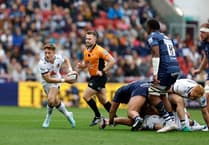A 20-year-old former student of Kingsbridge Community College, has achieved a remarkable milestone in his sports career by being selected to play for the Great Britain under-23 wheelchair basketball team.
This selection marks a significant achievement for Oscar Kinght, who has faced numerous challenges on his journey.
Initially, he was declassified due to his condition, complex regional pain syndrome (CRPS), which, despite rendering him unable to walk, was deemed ineligible.
In January 2020, the committee told wheelchair basketball's governing body, the IWBF, that it needed to change its classification regulations to comply with the new code.
Under the IPC's criteria, pain or hypermobility of joints are not eligible impairments for athletes, but amputated lower limbs are.
After an arduous process lasting two to three years, with extensive paperwork and persistence, his eligibility was finally recognized just three months ago.
Oscar explains. “I had an ineligible condition, even though I can’t walk. My mum got all the paperwork together, and we eventually got through as being eligible. It was a long process, but it’s all been worth it.”
Oscar's passion for wheelchair basketball began with a simple desire to stay active. He started playing basketball in his everyday chair on the school playground. Encouraged by his mother, he joined a local club in Plymouth, where he quickly adapted to the sport’s physical demands.
“Turning up to the sessions with sports chairs and seeing the physicality was a completely different game,” he recalls.
His commitment to the sport is evident in his rigorous training regime, which involves daily sessions focused on strength, speed, and power. Oscar also plays professionally in Spain, in the city of Vigo, an experience he credits with significantly enhancing his skills. “Playing against some of the best players in the world has definitely contributed towards my selection,” he notes.
Oscar spoke highly of the support he has received from his coaches, especially one in Plymouth who trusted him with coaching the team during a period of absence. This experience was crucial for his development both as a player and as a leader.
Looking ahead, Oscar has ambitious yet realistic aspirations. “If I keep on the trajectory I’m on, I’d love to have a Paralympic opportunity or play in the European Championships for seniors,” he says.
Oscar's journey is not just about personal triumph but also about the unwavering support from his family, particularly his mother. “She basically turned into my lawyer,” he laughs, recognizing her role in overcoming the classification hurdles.
As he prepares for the European Championships in Madrid, Oscar reflects on the significance of this achievement. “It’s a big goal of mine,” he admits, still coming to terms with the reality.



-and-Tom-(right).jpg?width=209&height=140&crop=209:145,smart&quality=75)
-Chris-Garner-Ed-Crawford-Bill-Keywood-(Torre-Vikin.JPG?width=209&height=140&crop=209:145,smart&quality=75)
Comments
This article has no comments yet. Be the first to leave a comment.